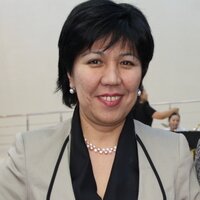Gulmira Sultangalieva


Gulmira Sultangalieva is professor of Historical faculty at al Farabi Kazakh National University. She graduated Kazakh State University named after S.M. Kirov. Gulmira Sultangalieva was awarded by a grant of Ministry of Education of RK "The best teacher of university" two times (2008, 2011). She was foreign visiting fellow at the Slavic Research Center, Hokkaido University, visiting professor of Wisconsin University and got scholarship of German Historical Institute in Moscow. She is ambassador of Hokkaido university (2018-2020, Japan).
The project
Title: Regional elite of nomadic peoples in the Russian Empire: comparative studies of Empires (18th – beg. 20th centuries)
Keywords: Сomparative research of policy of Russian Empire, social history nomads of Central Eurasia, formation of Kazakh officials in 19th century, role of Tatars mullahs, translators in the Kazakh steppe (18-19-th centuries)
Selected publications
The books:
- Volost’ and volostnye upravitely Collection of documents and materials. Almaty: Kazakh university. Edited by Sultangalieva G. 2018.298p.
- The Institute of volosts in the management system of the Kazakh steppe XIX - early XX centuries Almaty: Kazakh university. Edited by Sultangalieva G. 2018. 396 p.
- The nomadic peoples of Central Eurasia, XVIII-XIX centuries: the comparative historical analysis of the policy of the Russian Empire. Collected articles. Sultangalieva G. (edit.) Almaty "Kazakh University" 2015. - 296s.
- Kazakh officials on the service of the Russian Empire. Collection of documents and materials. Edited by Sultangalieva G. Almaty: Kazakh university. 2014.418p.
- History of Aktobe 20-40-s.XXc. in the documents. Aktobe. 2010
- The toponymy of the Aktobe region: historical and etymological description, classification, and strategy of renaming. Altobe.2009 (co-authors –Urasaeva K, Utalieva Zh)
- Journals and official notes of diplomat Tevkelev on history and ethnography of Kazakhstan Almaty.2005.T.3 481 p.
- History of Aktobe Uyezd (1868 - 1917). Aktobe.2005.264p.
- West Kazakhstan in the system of ethnocultural contacts (the XVIIIth – the beginning of the XXth c.c.), Ufa. 2001.-262p.
The articles:
- Distance and Distance Chiefs of the Kazakhs of the Orenburg Province (1830–1860) (co-author Zh. Dyussembekova) Bylye Gody. 2018. Vol. 50. Is. 4. P.1575-1583
- Understanding of Kazakh volost by Russian officials of the XIX century) (co-author Dalaeva T., Malikov B. ) Bylye Gody. 2017, Vol. 46, Is. 4. 1322-1332
- Казахские чиновники Российской империи 19в.: особенности восприятия власти // Cahiers du monde russe. 2015/4 Vol. 56 .p. 651 -680
- The Place of Kazakhstan in the Study of Central Asia. Kritika: Explorations in Russian and Eurasian History. 16,2 (Spring, 2015).P.346-358. (on English)
- Kazakh perceptions of Tatar officials in the Russian (Imperial) Administration in the eighteenth and nineteenth centuries //Proceedings of the XIIth Conference of the European Society for Central Asian Studies Central Asia: A Maturing Field Cambridge Scientific Publishers. 2015. P.203-218 (on English)
- The role of the pristavstvo institution in the context of Russian imperial policies in the Kazakh Steppe in the nineteenth century //Central Asian Survey 2014. Vol. 33, No. 1, p.62–79. (on English)
- Diploma at the noble rank of sultan. // Historical Archive. Moscow 2014. № 4 P.174-186 ( with T. Dalaeva) (on Russian)
- What is the difference between the shaman and neoshamanom? New Research of Tuva. №4. 2014. P.179-184(on Russian)
- Kazakh assessors of Orenburg Boundary Commission (first half of the XIX century.) // Bulletin of KazNU. Al-Farabi. Historical Series. №4.2013.C.30-36(on Russian)
- Novoileksk Line as the Boundary between Asia and Europe in a Historical Context //Borders and Transborder Processes in Eurasia, edited by Sergei V. Sevastianov, Paul Richardson, and Anton A. Kireev. Vladivostok: Dalnauka. 2013. С. 78-98. (on English)
- Central Asian policy of Russia and Tatar translators //History of Tatars from the ancient times Kazan. 2013 V.6. 339-342 p. (on Russian)
- The contribution of the Tatar translators in the study of history and culture of the Kazakh people //History of Tatars from the ancient times. Kazan. 2013 V.6. 351-357 p. (on Russian)
- Tatars in the administration of Kazakhstan (the first half of the nineteenth century.)//History of Tatars from the ancient times Kazan. 2013 V.6. 360-363 p. (on Russian)
- Influence of the Tatars of the Volga-Ural region on process of development of agriculture
- in Kazakhs and the policy of the Russian authorities (the first half of the nineteenth
- century.)//History of Tatars from the ancient times Kazan. 2013 V.6. 357-360 p. (on Russian)
- The Russian Empire and the Intermediary Role of Tatars in Kazakhstan: The Politics of Cooperation and Rejection, from the Second Half of the Eighteenth to the Early Twentieth Century// Asiatic Russia: Imperial Power in Regional and International Contexts. London,2012 (on English)
- Trading market of the Southern Urals and Western Kazakhstan: problems of interregional interaction (the second half of the eighteenth XIXc.) / / The Volga-Ural region in the imperial space of the eighteenth XVIII-XIX c. Moscow: Oriental Literature. 2011(on Russian)

Eleonora Saracino

Sang-Soo Park

Georg Jostkleigrewe


